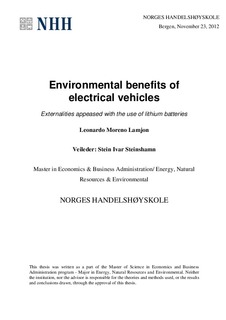| dc.description.abstract | Road transportation creates several negative externalities; these are a key development challenge. The most important of which are environmental pollution, greenhouse gas emissions, congestion (time delay and extra fuel consumption), impacts in human health, noise, etc.
Based on the existing literature and theory, the author illustrates different the characteristics and magnitude of externalities associated with the use of road transportation and in what extent electric vehicles based on lithium batteries can mitigate those negative impacts in the environment and human health. Fully electric vehicles based on lithium batteries are being introduced to the market. There are existing and proposed standards for the design and market considerations that must to be taken into account to reduce the risk of failure of this new technology as well as policy instruments aimed at reducing greenhouse gas emission. Although traditional fiscal instruments, such as fuel taxes and subsidies, are normally introduced for other purposes, they can also help to reduce these externalities. Multiple options apart of lithium batteries need to be used simultaneously to reduce effectively the different externalities arising from road transportation because most of those options are not mutually exclusive. | no_NO |
